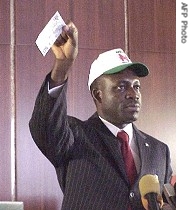-
(单词翻译:双击或拖选)
Abuja
15 August 2007
Nigeria has won praise from the international community for free-market reforms that have spurred high levels of growth, slashed1 inflation and earned the country significant debt relief. And as Gilbert da Costa reports for VOA from Abuja, it is now planning to restructure the country's currency.
 |
| Central Bank Governor Charles Soludo raises a new naira note in Abuja, 28 Feb 2007 |
Central Bank Governor Chukwuma Soludo says the plan involves dropping two zeroes off the naira. Soludo says the change will make it easier to manage inflation, cut back on production costs, and promote the use of small-denomination3 coins. He says it will also alleviate4 the burden on consumers, who have to carry large bundles of naira bills just to purchase daily staples5.
"Redenomination and introduction of totally new currency structure, following the progress made with other reforms and the enabling conditions in the economy today, are designed to better anchor the inflationary expectations, strengthen public confidence in the naira, make for easier conversions6 to other currencies, eliminate higher denomination notes with lower value and reduce the cost of production, distribution and processing of currencies, promote the usage of coins and lay the foundation for the convertibility7 of the naira," said Soludo.
International financial experts are generally pleased with Nigeria's efforts to improve its economy. It has achieved high levels of growth, reduced inflation to single digits8, and won $18 billion in debt relief last year. And President Umaru Yar'Adua's has pledged to deepen the economic reforms carried out by his predecessor9, former President Olusegun Obasanjo.
An IMF team is due to visit Nigeria later this month for discussions with officials on what is known as the Policy Support Initiative, a joint10 IMF-Nigerian initiative to boost production while keeping a tight grip on inflation.
In line with the federal government's strict control of public spending, a large chunk11 of Nigeria's windfall oil revenue is now being kept in what is known as the excess crude account. Nigeria's total foreign reserves stand at $43 billion, up from just $7 billion a few years ago.
Recently, the federal government has come under pressure from Nigeria's semi-autonomous states to release the foreign reserves to alleviate poverty.
But the International Monetary12 Fund representative in Nigeria, Michael Bell, says it is essential for Nigeria to limit spending to help control inflation and prevent the boom and bust13 cycles caused by oil price swings.
"In the last few years, Nigeria has set itself an oil reference point, and it has managed to sustain significant levels of oil savings," he said. "I think one of the challenges going forward is to continue that performance. Many people recognize that there are pressures for a higher rate of expenditure14 from the oil revenues. Nigeria has to thread a careful path between ensuring as rapid a development as possible without destabilizing the economy."
Nigeria, Africa's largest oil producer, is the second largest economy in sub-Saharan Africa.
 收听单词发音
收听单词发音
1
slashed

|
|
| v.挥砍( slash的过去式和过去分词 );鞭打;割破;削减 | |
参考例句: |
|
|
|
2
sector

|
|
| n.部门,部分;防御地段,防区;扇形 | |
参考例句: |
|
|
|
3
denomination

|
|
| n.命名,取名,(度量衡、货币等的)单位 | |
参考例句: |
|
|
|
4
alleviate

|
|
| v.减轻,缓和,缓解(痛苦等) | |
参考例句: |
|
|
|
5
staples

|
|
| n.(某国的)主要产品( staple的名词复数 );钉书钉;U 形钉;主要部份v.用钉书钉钉住( staple的第三人称单数 ) | |
参考例句: |
|
|
|
6
conversions

|
|
| 变换( conversion的名词复数 ); (宗教、信仰等)彻底改变; (尤指为居住而)改建的房屋; 橄榄球(触地得分后再把球射中球门的)附加得分 | |
参考例句: |
|
|
|
7
convertibility

|
|
| n.可改变性,可变化性;兑换 | |
参考例句: |
|
|
|
8
digits

|
|
| n.数字( digit的名词复数 );手指,足趾 | |
参考例句: |
|
|
|
9
predecessor

|
|
| n.前辈,前任 | |
参考例句: |
|
|
|
10
joint

|
|
| adj.联合的,共同的;n.关节,接合处;v.连接,贴合 | |
参考例句: |
|
|
|
11
chunk

|
|
| n.厚片,大块,相当大的部分(数量) | |
参考例句: |
|
|
|
12
monetary

|
|
| adj.货币的,钱的;通货的;金融的;财政的 | |
参考例句: |
|
|
|
13
bust

|
|
| vt.打破;vi.爆裂;n.半身像;胸部 | |
参考例句: |
|
|
|
14
expenditure

|
|
| n.(时间、劳力、金钱等)支出;使用,消耗 | |
参考例句: |
|
|
|















